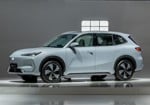Fleets are being urged to insist that all of their vehicles are fitted with electronic stability programmes (ESC) as standard.
Currently only 37% of the top ten fleet cars have ESC fitted and only 19% of fleets mandate ESC as compulsory safety equipment.
“The task is now for all fleet managers to demand that ESC is included in discussions with their vehicle supplier and to support the majority call to make ESC standard equipment,” said Julie Jenner, ACFO chairman.
The BVRLA, whose members supply vehicles to the vast majority of the country’s fleets, has also come out in support of the call.
“There appears to be a good case that ESC can play a significant role in reducing accidents,” said BVRLA director general, John Lewis.
“If it is the case that the research is as robust as it appears, then we would say that ESC should be included as standard.”
However, the issue over who should pay for this safety feature remains.
EurotaxGlasses’s suggests a car with ESC will be no more attractive to used buyers than one without.
Therefore, fleet managers must negotiate hard with their vehicle suppliers.
A recent survey indicated that fleet mangers valued ESC at over £570.
However, the cost is mush less – in the region of £80 according to US research.
This suggests that fleets can demand ESC at a minimal cost.
Some fleet managers are demanding that their lease suppliers provide cars with ESC fitted at no additional cost.
With the arrival of the Corporate Manslaughter Act just over a week away, the argument for making ESC compulsory becomes stronger as doing so will demonstrate a company has taken its duty of care responsibilities
“ESC offers business leaders and fleet managers an effective and lasting solution to risk management,” said David Ward, director general of the FIA Foundation and president of the ChooseESC Campaign.
“I would urge all fleet operators to take this simple step: if you are thinking of renewing your fleet make sure it has ESC on board.”
Research backing the campaign to get fleets to demand ESC as standard was recently carried out by Bosch.
It found that of 215 fleet managers questioned, who between them run 77,350 cars and light commercials, almost 90% said ESC should be standard equipment.
However, the survey also highlighted a major failing by leasing companies that are not educating their customers – fleet managers – about the benefits of technologies such as ESC.
It found that a third of fleet managers believe their leasing company does not provide sufficient advice on vehicle safety.
ESC combines the functions of the ABS anti-locking braking system and the traction control system to help drivers avoid crashing by reducing the risk of skidding, especially when swerving or cornering.
The system will be standard by 2012 on new cars in Europe.
However, while independent research published by the Department for Transport suggests 25% of fatal road crashes could be avoided if every car was fitted with ESC, relying solely on technology must be avoided.
“There is a suggestion that ESC will extricate a driver from trouble whatever the circumstances, and that all they have to do is sit back and let the system take over.
"This is patently not true but getting the message across is not easy,” explains Steve Johnson from DriveTech.
“We have to make it clear that drivers still have an obligation to assess risk constantly and moderate behaviour accordingly.”
















Login to comment
Comments
No comments have been made yet.